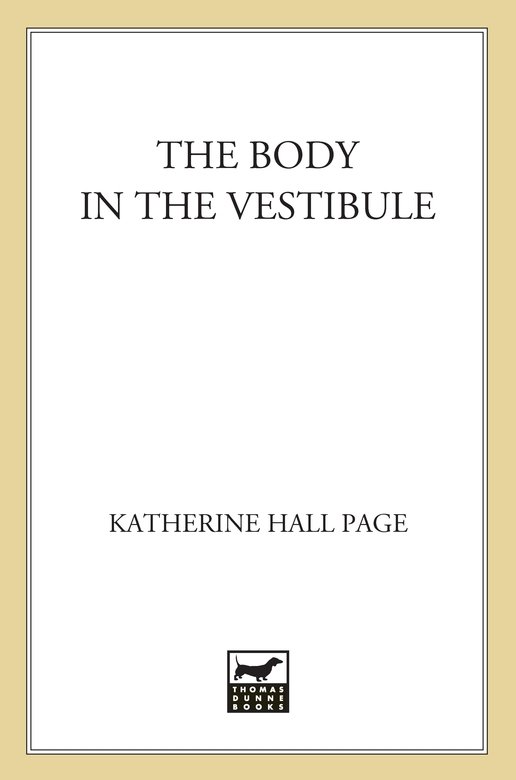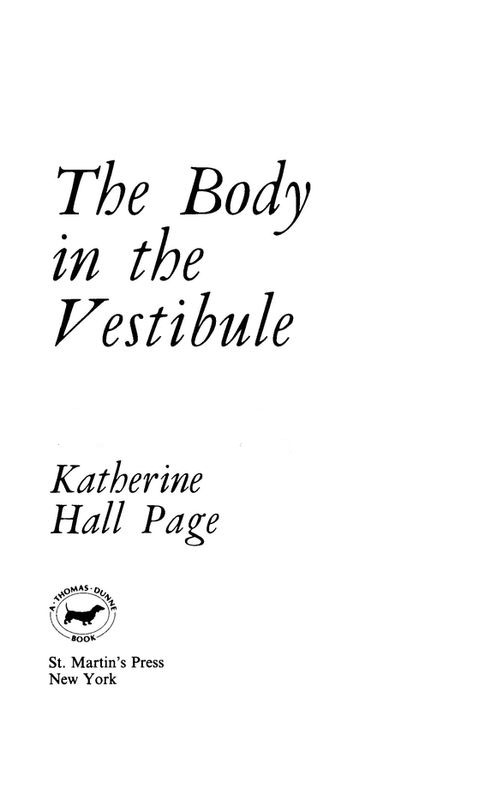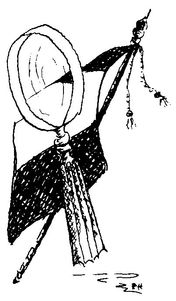The Body In the Vestibule
Read The Body In the Vestibule Online
Authors: Katherine Hall Page



Table of Contents
For Ruth Cavin, editor nonpareil

My thanks to the following friends and their families, who introduced me to their own particular Lyon and who keep bringing me back for more: especially François, Michele, Barbara, and Renaud Vital-Durand, our first guides and champion correspondents; Christine Baladier and François Mougiere; Marie-Annick Billioud; Anne, Gérard, Amélie, Marine, Alexis, and Anouck Champsaur; Madeleine and Michel Deborde; Pierre-Louis Giannetti and Chantal and Leonard Caliendo; Marc and Jacqueline Jeannerod; Françoise, Henry, and Maud Kennedy; Michele and Michel Magnin. And to Alan and Nicholas, who are always ready to go anywhere and eat anything.
“Le mauvais goût mène au crime.”
“Bad taste leads to crime.”
“Bad taste leads to crime.”
âAn early French proverb or the Baron Adolphe de Mareste (1784-1867), depending on whom you believe.
Â
“Three men, one from Paris, one from Marseille, and one from Lyon, are standing by the side of the road watching a girl ride by on a horse. The Parisian says, âLook at that horse!' The Marseillais says, âLook at that girl!' and the Lyonnais says, âWhose daughter is she?'
âAnonymous

There are many ghosts in the city of Lyon. Some appear at twilightâon the Place Bellecour when a couple strolling across the large, open square may find the shadows suddenly deepened, the breeze cooled by the memory of the guillotine that once filled the gardens with cries for blood.
Other ghosts wait until the city is dark and different noises fill the
traboules,
the long, ancient passageways snaking down from the Croix Rousse
colline
to the quais below. These are the sounds of the silk workers, hungry, exhausted, leaving the clatter of the looms to carry the richly glowing brocades to the waiting ships.
traboules,
the long, ancient passageways snaking down from the Croix Rousse
colline
to the quais below. These are the sounds of the silk workers, hungry, exhausted, leaving the clatter of the looms to carry the richly glowing brocades to the waiting ships.
Sometimes, the night watchman at the Musée des Beaux-Arts thinks he hears nuns chanting, looks out the window into the ancient cloister, notes the rustling leaves in the birch trees, and quickly crosses himself.
Then there are the ghosts that are not ghosts, the shadows that move rapidly up the steep stairs from the Place des Terreaux and vanish into the
traboules.
The next day, a child hastening to school may kick aside an empty syringe, stumble across some broken glass, smell the night smells, and emerge gratefully into the morning air.
traboules.
The next day, a child hastening to school may kick aside an empty syringe, stumble across some broken glass, smell the night smells, and emerge gratefully into the morning air.
To know the city is to know all the ghosts.
Â
Faith Sibley Fairchild waited impatiently for the light to change on the Quai St. Antoine so she could get to the open-air market on the other side of the street. Several times, she was tempted to dart across the traffic, yet after a week in Lyon, she had not only learned which baker had the best bread but that French drivers would not hesitate to mow you down if you put so much as a toe in the way of their Renaults and Peugeotsârespectable-looking individuals hurling quite unrespectable phrases out the window in the process. It was just like Boston, in fact.
She swung her empty straw market basket, her
panier,
idly back and forth. Despite the delay, she felt a lovely sense of well-being. Her husband, the Reverend Thomas Fairchild, was happily engaged in work; her three-year-old son, Benjamin, was happily playing at nursery school; she'd happily made it through four enervating months of pregnancy and still wanted to have a baby; andâmost important of allâshe was in France for a month. It had been a wonderful incentive for getting over morning sickness, which in Faith's case came like clockwork at dinnertime. The idea of passing up the fabled food of Lyon was unthinkable. Whatever the reason, this pregnancy had been better than the first, or rather less worse, and now all her appetites were back.
panier,
idly back and forth. Despite the delay, she felt a lovely sense of well-being. Her husband, the Reverend Thomas Fairchild, was happily engaged in work; her three-year-old son, Benjamin, was happily playing at nursery school; she'd happily made it through four enervating months of pregnancy and still wanted to have a baby; andâmost important of allâshe was in France for a month. It had been a wonderful incentive for getting over morning sickness, which in Faith's case came like clockwork at dinnertime. The idea of passing up the fabled food of Lyon was unthinkable. Whatever the reason, this pregnancy had been better than the first, or rather less worse, and now all her appetites were back.
And at four months, she did not have the sensation of two bodies occupying the same and equal amount of space at one time, which was contrary to somebody's law, and, recalling the experience now, Faith felt, should surely be
against whoever's it was. Four months was a little gift from nature, a hiatus of sorts, to allow prospective parents to paint the nursery, read thirty or forty books of baby names, and, if so gifted or inclinedâFaith was neitherâknit a bootie or two before settling in for the long stretch. It was a time when you thought of soft little bottoms and tiny kissable fingers, not dirty diapers or sleepless nights.
Well-being
was exactly right. She felt well right down to her toenails and even slightly mellow, edges blurred. This was a very different Faith from the one normally known to her near and dear. That Faith's crisp judgments about the world and its inhabitants were swiftly uttered more often than not. Now they were hidden in some warm, fluffy corner of her brain. She was enjoying this kinder, gentler state for the moment, secure in the knowledge that it wouldn't last long and soon she'd be back in full form.
against whoever's it was. Four months was a little gift from nature, a hiatus of sorts, to allow prospective parents to paint the nursery, read thirty or forty books of baby names, and, if so gifted or inclinedâFaith was neitherâknit a bootie or two before settling in for the long stretch. It was a time when you thought of soft little bottoms and tiny kissable fingers, not dirty diapers or sleepless nights.
Well-being
was exactly right. She felt well right down to her toenails and even slightly mellow, edges blurred. This was a very different Faith from the one normally known to her near and dear. That Faith's crisp judgments about the world and its inhabitants were swiftly uttered more often than not. Now they were hidden in some warm, fluffy corner of her brain. She was enjoying this kinder, gentler state for the moment, secure in the knowledge that it wouldn't last long and soon she'd be back in full form.
It was a long light and the traffic continued to stream by. Faith's mind wandered back to the February afternoon when Tom had come home with the news that he had an opportunity to spend a month in France working on his dissertation. She'd been huddled on the living room sofa, wrapped in a down comforter, trying to convince herself that she had made a wise choice when she left a glittering career as one of Manhattan's most successful caterers to be a parson's wife and mother of one and two-ninths children in the small (and at present very cold) village of Aleford, Massachusetts. Tom, rosy-cheeked from the frosty air, his thick reddish brown hair hatless, his coat unbuttoned, had come bounding through the front door, lustily singing “La Marseillaise” at the top of his voice. The sight of all that energy was so galling, Faith had wanted to throw something at him. But there had been nothing at hand and it would have required too much effort to get up.
He'd grabbed her and cried, “Faith,
ma chérie,
we're going to France! Soon! April, if I can swing it!”
ma chérie,
we're going to France! Soon! April, if I can swing it!”
Tom had spent an undergraduate year in Paris, developing
a fluency in the language and a permanent love affair with the country. He'd also acquired a number of friends, and if he was currently no longer in touch with a certain Simone, he was with Paul Leblanc, a graduate student who'd lived in the same pension. It was a letter from Paul, now in the history department at the Université de Lyon, that Tom was waving ecstatically as he told Faith of the proposal. Paul had learned he could bring in visiting scholars to give a lecture or two, offering them a small honorarium and the chance to do research at the university in return. He'd known Tom had been struggling to finish his work on the effects of the Albigensian heresy in twelfth-century France on subsequent Christian practice and he thought his old friend might want to make use of the university's famous library. Tom most certainly did.
a fluency in the language and a permanent love affair with the country. He'd also acquired a number of friends, and if he was currently no longer in touch with a certain Simone, he was with Paul Leblanc, a graduate student who'd lived in the same pension. It was a letter from Paul, now in the history department at the Université de Lyon, that Tom was waving ecstatically as he told Faith of the proposal. Paul had learned he could bring in visiting scholars to give a lecture or two, offering them a small honorarium and the chance to do research at the university in return. He'd known Tom had been struggling to finish his work on the effects of the Albigensian heresy in twelfth-century France on subsequent Christian practice and he thought his old friend might want to make use of the university's famous library. Tom most certainly did.
“I've checked the calendar and you know Easter is early this year. I'd have to be here then, of course, but we could leave by the middle of April. I can get people to cover the pulpit for a month. Lord knows, I've done it often enough myself for others.”
“I'm sure He does,” Faith agreed, her mindâand bodyâin a whirl. “But, darling, what about the restâall the meetings, the hand-holdings, not to mention the serious stuff?”
Tom had been momentarily perturbed. “I've been wrestling with that all afternoon. The opportunity to finish my doctoral work is important to the parish, certainly, except I know I want to go just for the fun of it, too. Maybe even mostly. I'm sure First Parish could survive for a month without me, probably a whole lot longer, butâ”
Faith had interrupted him there. Lyon was in the southern part of France. It would be warm. Her way was clear.
As it turned out, the congregation was unanimous in its support and in typical Yankee fashion seemed to be looking forward to coping on its own in novel and ingenious
ways. The lone nay-sayer was Millicent Revere McKinley, better known in the Fairchild household as a strong contender for the world semiprofessional meddler title. Millicent kept an eye on things from her strategically located clapboard house across from the village green, as well as an ear firmly directed toward whatever ground she happened to be treading. And Millicent covered a lot of territory. The sole reason Faith characterized her as “semiprofessional” was because of Millicent's oft-stated aversion to paid employment as being, well, slightly déclassé. There was no question that she was a pro.
ways. The lone nay-sayer was Millicent Revere McKinley, better known in the Fairchild household as a strong contender for the world semiprofessional meddler title. Millicent kept an eye on things from her strategically located clapboard house across from the village green, as well as an ear firmly directed toward whatever ground she happened to be treading. And Millicent covered a lot of territory. The sole reason Faith characterized her as “semiprofessional” was because of Millicent's oft-stated aversion to paid employment as being, well, slightly déclassé. There was no question that she was a pro.
“We've always been Congregationalists, of course,” Millicent would announce to all and sundry in the checkout line at the Shop and Save, or wherever else she could find a captive audience. Her tone clearly indicated that none of the men of
her
cloth would do such a quixotic thing. The only legitimate reason for a minister to abandon his flock was missionary work, and although she believed the French were no better than they should be, and might well qualify, she doubted that was what the Fairchildsâespecially Faith, she'd added to a select fewâhad planned. “Mind you,” she'd told Hattie Johnston, the ex-postmistress, whose former position and generous attitude toward what someone wrote on a postcardâif it was meant to be private, they'd have written a letterâhad cemented the friendship between the two women. “Mind you, I'm not criticizing Faith, but you
know
she's only going there to buy more clothes, and somehow she's convinced poor Tom to go along. Research, my eye. Doesn't he have the Boston Public Library right here?”
her
cloth would do such a quixotic thing. The only legitimate reason for a minister to abandon his flock was missionary work, and although she believed the French were no better than they should be, and might well qualify, she doubted that was what the Fairchildsâespecially Faith, she'd added to a select fewâhad planned. “Mind you,” she'd told Hattie Johnston, the ex-postmistress, whose former position and generous attitude toward what someone wrote on a postcardâif it was meant to be private, they'd have written a letterâhad cemented the friendship between the two women. “Mind you, I'm not criticizing Faith, but you
know
she's only going there to buy more clothes, and somehow she's convinced poor Tom to go along. Research, my eye. Doesn't he have the Boston Public Library right here?”
For once in her life, Millicent was wrong. Faith was also going to eat French food.
But everything had worked out and the plane had left Logan Airport as a light snow was falling. Faith had contentedly watched the lights of Boston harbor and the expressways grow dimmer and dimmer until they disappeared
altogether. “Good-bye Boston. Good-bye Aleford.” Ben and she had waved out the tiny window, filled with a swirl of snowflakes. “Good-bye goldfish-bowl life,” Faith had added in a whisper. As the date for departure had drawn closer, she'd been filled with an even greater than usual longing for anonymity.
altogether. “Good-bye Boston. Good-bye Aleford.” Ben and she had waved out the tiny window, filled with a swirl of snowflakes. “Good-bye goldfish-bowl life,” Faith had added in a whisper. As the date for departure had drawn closer, she'd been filled with an even greater than usual longing for anonymity.
Faith was no stranger to parish life. Her grandfather and father had both been ministers, and despite having lived in a parsonage that was a duplex on New York's Upper East Side and enjoying relative privacy, she'd decided by the time she was twelve there was no way she'd ever marry a minister. But at twelve, she hadn't yet met Tom.
Brakes were squealing. She was jerked back into sun-drenched Lyonâmiles and worlds away. She looked at the people on either side of her. The wonderful thing about travel was that on a certain level you ceased to exist. Nobody knew her nameâor that she hated baked beans, and sometimes took a Judith Krantz out of the library, or directed meaningful glances at her abdomen, or â¦
It was great.
The light changed and Faith crossed the street. She'd been to
le marché
St. Antoine almost every day since she'd arrived and still got excited when she looked down the seemingly endless array of stalls that stretched along the river Saône. She started walking, passing the flower sellers first, who called out, “
Bonjour
, Madame Fairsheeld” to her. She'd be back later. It was a pleasure, almost an honor,
not
to be anonymous here. Then past the old lady sitting behind a small card table with her cartons of fresh eggs, a few onions, some herbs, and today some bunches of flowers stuck into ancient tin cans of water. As usual, she was wearing two sweaters under her apron and a black kerchief on her head. She sat quietly, patiently, in contrast to the noise and crowds around herâthe cries of other vendors
piercing through the dinâ“
Un kilo, dix francs! Super! Un kilo, un kilo ⦔
le marché
St. Antoine almost every day since she'd arrived and still got excited when she looked down the seemingly endless array of stalls that stretched along the river Saône. She started walking, passing the flower sellers first, who called out, “
Bonjour
, Madame Fairsheeld” to her. She'd be back later. It was a pleasure, almost an honor,
not
to be anonymous here. Then past the old lady sitting behind a small card table with her cartons of fresh eggs, a few onions, some herbs, and today some bunches of flowers stuck into ancient tin cans of water. As usual, she was wearing two sweaters under her apron and a black kerchief on her head. She sat quietly, patiently, in contrast to the noise and crowds around herâthe cries of other vendors
piercing through the dinâ“
Un kilo, dix francs! Super! Un kilo, un kilo ⦔
Faith squeezed by an elegant Lyonnaise ruthlessly bargaining at a fruit stall for a flat of clementines, her chunky gold bracelets glittering as brightly as the shiny fruit. The lettuce man was next. He had a large beet-red face and wore bright blue workers' overalls. He'd been the first to tell Faith the old chestnut about there being three rivers running through Lyon: the Rhône, the Saône, and the Beaujolais. The veins on his nose attested to his familiarity with the latter at least. He greeted her warmly. âAh,
mon chou,
what will it be today?” Then he deftly mixed the varieties she indicated, weighed them, and wrapped them in a square of brown paper.
mon chou,
what will it be today?” Then he deftly mixed the varieties she indicated, weighed them, and wrapped them in a square of brown paper.
Most of the vendors had umbrellas over their tables, which rested on trestles, or, in the case of the larger motorized stalls stocked inside with goods, the side of the truck lifted up to shade the wares. The rows of
platane
trees lining the river on both sides arched into another awning higher up. Through them all, the strong April sun still managed to find an opening and shone in bright spots on the asphalt strewn with debrisâvegetable peel, flower stems, crusts of bread, stubs of the yellow cigarettes favored by the farmers.
platane
trees lining the river on both sides arched into another awning higher up. Through them all, the strong April sun still managed to find an opening and shone in bright spots on the asphalt strewn with debrisâvegetable peel, flower stems, crusts of bread, stubs of the yellow cigarettes favored by the farmers.
Faith headed for the cheeses. She didn't have time to go over to Fromagerie Richard in Les Halles de Lyon, the large indoor market on the other side of the Rhône. There was no question, mother and daughter Richard, both attractive blondes with unfailing smiles, were the queen and crown princess of cheesemongers. Still, Faith's mouth watered as she looked at the array before her at the quai. If she could get St. Marcellin, perfectly runny as it was today, back in Aleford, she'd never complain about living there again.
She tucked the package into her
panier
and moved on. It was too late for the sport of chef-spotting. Other days, she'd been delighted by the regal procession of the area's
famous
cuisiniers
âBocuse, Lacombe, Chaventâusually in spotless, starched white jackets with names discreetly embroidered over the pocket, selecting just the right melon or string bean. They caressed the fruit, snapped the vegetables for freshness, and moved on with an entourage of kitchen help trailing along to load the purchases into large carts and settle the accounts.
panier
and moved on. It was too late for the sport of chef-spotting. Other days, she'd been delighted by the regal procession of the area's
famous
cuisiniers
âBocuse, Lacombe, Chaventâusually in spotless, starched white jackets with names discreetly embroidered over the pocket, selecting just the right melon or string bean. They caressed the fruit, snapped the vegetables for freshness, and moved on with an entourage of kitchen help trailing along to load the purchases into large carts and settle the accounts.
Other books
Bones of the Empire by Jim Galford
Hallowed Ground by Rebecca Yarros
The Wombles Go round the World by Elisabeth Beresford
The Human Comedy by Honore de Balzac
Sins of a Duke by Suzanne Enoch
EmbracedbyaWarrior by Marisa Chenery
Cupids by Paul Butler
A Secret Affair by Valerie Bowman
The Third Wave by Alison Thompson
